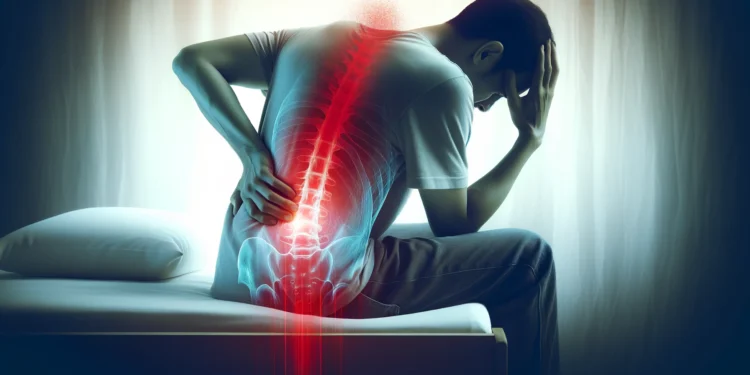Back pain and nausea are two symptoms that, when experienced together, can be concerning. While they may seem unrelated, they often share common underlying causes. Understanding the potential reasons behind these symptoms, along with effective treatments and prevention methods, can help you manage discomfort and improve overall well-being.
Common Causes of Back Pain and Nausea
Several health conditions can cause both back pain and nausea. Some of the most common include:
Read Also: Back Pain Meme: Humor That Relieves the Ache – Laughing Through the Pain!
Kidney Stones
Kidney stones are hard mineral deposits that form in the kidneys and can cause severe pain in the lower back, along with nausea and vomiting. Other symptoms include difficulty urinating, blood in the urine, and a frequent urge to urinate.
Gallbladder Disease
Gallbladder conditions, such as gallstones or inflammation, can cause upper back pain, particularly on the right side, along with nausea, bloating, and digestive issues.
Spinal Issues
Conditions such as herniated discs, sciatica, and spinal infections can lead to back pain that radiates to other parts of the body, often accompanied by nausea due to pain severity or nerve compression.
Gastrointestinal Disorders
Digestive issues such as acid reflux, gastritis, and ulcers can lead to nausea and discomfort that may be felt in the back, especially in the upper or middle regions.
Pregnancy
Hormonal changes, weight gain, and shifts in posture during pregnancy can lead to back pain, while nausea is a common symptom of morning sickness, particularly in the first trimester.
Infections or Inflammatory Conditions
Conditions like urinary tract infections (UTIs) and pancreatitis can cause pain in the lower or upper back, often paired with nausea, fever, and other systemic symptoms.
When to Seek Medical Attention

While occasional back pain and nausea may not be a cause for concern, seek medical attention if you experience:
- Severe or persistent pain
- Vomiting that lasts more than 24 hours
- Unexplained weight loss
- Blood in urine or stool
- Fever or chills
- Weakness or numbness in the legs
Treatment Options for Back Pain and Nausea
The best treatment depends on the underlying cause. Here are some general approaches:
1. Pain Management
- Over-the-counter pain relievers like ibuprofen or acetaminophen can help reduce back pain.
- Muscle relaxants may be prescribed for severe muscle spasms.
2. Hydration and Dietary Adjustments
- Drinking plenty of water can help prevent kidney stones and keep digestion smooth.
- Avoiding fatty or spicy foods can reduce nausea related to digestive issues.
3. Physical Therapy and Exercise
- Gentle stretching and strengthening exercises can improve posture and alleviate spinal pain.
- Yoga and low-impact workouts may help relieve muscle tension.
4. Home Remedies
- Applying heat or ice packs to the affected area can soothe back pain.
- Ginger tea or peppermint can help ease nausea naturally.
5. Medical Interventions
- If gallbladder disease or kidney stones are diagnosed, surgical removal or medical procedures may be required.
- Prescription medications may be necessary for gastrointestinal or inflammatory conditions.
Prevention Tips for Back Pain and Nausea
To reduce the likelihood of experiencing these symptoms together, consider the following preventative measures:
- Maintain a healthy diet rich in fiber and lean proteins.
- Stay hydrated to support kidney and digestive health.
- Engage in regular physical activity to strengthen back muscles and promote digestion.
- Manage stress through meditation, deep breathing, or therapy.
FAQs:
1 What causes back pain and nausea together?
Back pain and nausea can result from kidney stones, digestive issues, spinal conditions, pregnancy, or infections.
2 When should I see a doctor for back pain and nausea?
Seek medical help if symptoms are severe, persistent, or accompanied by fever, vomiting, blood in urine/stool, or numbness.
3 Can stress cause both back pain and nausea?
Yes, stress can lead to muscle tension in the back and affect digestion, causing nausea.
4 What home remedies help relieve back pain and nausea?
Staying hydrated, using heat or ice therapy, practicing gentle stretches, and drinking ginger tea can help manage symptoms.
5 Can a poor diet contribute to back pain and nausea?
Yes, dehydration, poor nutrition, and excessive processed foods can lead to digestive issues and muscle discomfort, worsening symptoms.
Conclusion:
Recognizing the underlying cause of back pain and nausea is key to effective management. By maintaining a balanced lifestyle, incorporating ergonomic habits, and seeking timely medical advice, you can alleviate symptoms and improve your overall well-being.
Read More Relevant Article:
- Read Also: COVID Back Pain: Causes, Prevention, and Recovery – Managing Back Pain During COVID!
- Read Also: Best Mattress Pad for Back Pain: A Comprehensive Guide – Top Mattress Pads for Back Pain Relief!
- Read Also: Back Pain in Matawan NJ: Finding Relief and Treatment Options – Back Pain in Matawan NJ!











